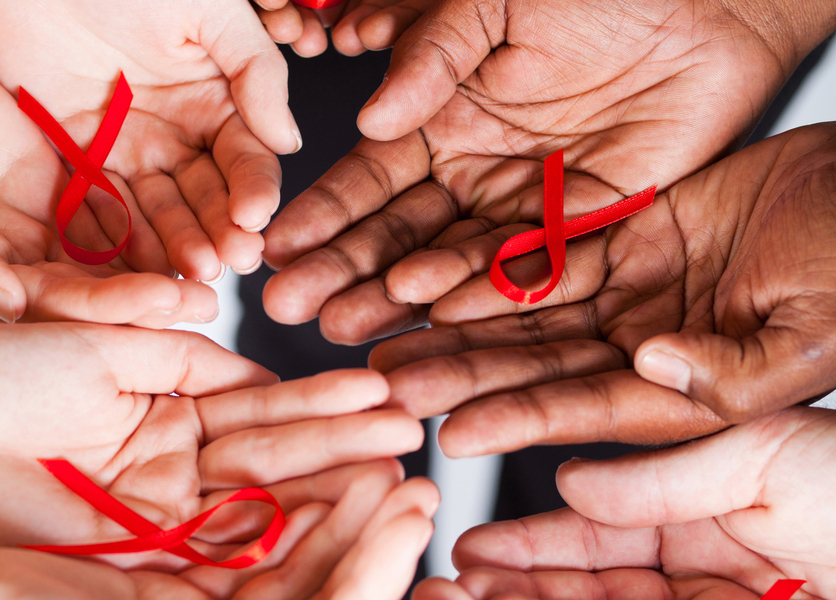Dec. 1 is World AIDS Day, a time to raise awareness of HIV (human immunodeficiency virus), which often culminates in AIDS, (acquired immune deficiency syndrome). On this day, the ELCA encourages congregations to have open and affirming conversations about the health epidemic.
“It’s a general time that people have recognized for years now as a day of remembrance [for those we’ve lost], a day of commitment to action,” said Megan Neubauer, program associate for the ELCA strategy on HIV and AIDS and coordinator of domestic hunger initiative pilot projects.
There are 36.7 million people living with HIV and AIDS, according to UNAIDS (2016). In the U.S. that number is little over a million, the Centers for Disease Control and Prevention states. “[The epidemic has] fallen out of the conversation, out of the focus, but it’s something that’s still around, it’s still affecting people and it’s something we know we can prevent and treat,” she added.
This church’s strategy is administered by ELCA World Hunger because a connection exists between poverty and HIV/AIDS, the ELCA Strategy on HIV and AIDS says. Grants and other funding methods support prevention care and treatment, as well as programs to help eradicate the stigma associated with HIV and AIDS.
Addressing housing in San Francisco
Although the U.S. has a relatively low prevalence compared to some countries—in Swaziland, Botswana and Lesotho, the CIA World Factbook reports that more than 20 percent of the population has the disease, while the U.S. is at less than 1 percent—it’s still an epidemic to be concerned with, said Nancy Nielsen, deputy director of Lutheran Social Services of Northern California (LSSNC).
“San Francisco was kind of ground zero when the epidemic began,” Nielsen said. “The health department embraced this epidemic and put services in place, and it has evolved over 30 years now.”
Many of the agency’s clients receive disability benefits, funds from Veterans Affairs and/or income from a job. Many also have a high incidence of mental health or substance abuse issues that complicate their ability to manage their money and thereby maintain housing, said John Paul Soto, LSSNC program manager.
That’s why the agency provides three programs to aid those affected by HIV and AIDS: money management, forensic housing and stabilization housing, which combined serve nearly 700 San Franciscans every year.
The money management program helps clients prioritize their bills by first making sure they pay their rent on time, then paying other bills and managing the rest of their income, he said.
“We have always supported the idea that housing is health care,” Soto said. “Having a roof over your head is such a big change and sense of satisfaction for folks that it allows them to focus on other aspects of their life, whether it’s medical, mental or some other issue that they have going on.”
The forensic housing program has a similar focus. It provides housing and support services for HIV-positive homeless people who have recently been released from prison or have a history of incarceration, Soto said.
The stabilization housing program, meanwhile, is an emergency intervention effort that temporarily places HIV-positive clients in an apartment to get them off the streets and in reach of needed services, Nielsen said.
The ELCA has reached out with a World Hunger grant to help the LSSNC fund on-site nutrition counseling for those in the two housing programs, Soto said. Interns from the University of San Francisco host weekly nutrition classes to teach clients how to eat healthy, even if they have a small budget and only a microwave for cooking.
“When you have better health outcomes, the observable stigma [surrounding HIV and AIDS] is a lot less when someone is a lot more stable because it does make them feel better about themselves if they’re not as vulnerable,” Soto said.
Administering care in Swaziland
As a world leader in HIV and AIDS prevalence, Swaziland became a country of focus for World Hunger.
Four years ago, the Ezulwini HIV and AIDS Project—run by the Eastern Diocese of the Evangelical Lutheran Church in Southern Africa, a companion of the ELCA—began sending several caregivers door-to-door to provide in-home care to people living with the disease.
About 180 people are visited at least three times a week by these government-trained nurses. They not only encourage families to get tested for HIV, but also provide those already affected with food parcels and hygiene packs and make sure patients take their medication.
Another major program initiative is to teach participants how to create backyard gardens so they’re not solely dependent on handouts.
Perhaps one of the program’s biggest successes is the gradual shift in attitude that has led many to understand that someone living with the disease can still lead a healthy life if it is well-managed, project leaders said.
“HIV and AIDS used to be this very big secret that we all witnessed but no one spoke about, but now we talk about it openly,” said Ellen Dlamini, one of the caregivers. “We are helping each other to cope.”
Combating stigma in Indonesia
A three-year World Hunger grant is benefiting the AIDS Ministry of Huria Kristen Batak Protestan (HKBP) in Indonesia.
Five full-time staff members support the ministry, which was established in 2003 and continually works to inform its 4.5 million church members about the concerns of HIV and AIDS while also reducing the stigma that plagues those living with the disease.
“We are ready to serve people,” said Nurhayati Silalahi, an HKBP deaconess. “We are ready to be neighbors.”
Several projects are ongoing:
- For years the AIDS Ministry has worked to create a relationship with the H. Adam Malik Hospital in North Sumatra to provide antiretroviral medicine to patients. In 2009 the government allowed this hospital to give medical treatment directly to HIV and AIDS patients.
- A peer educator program at schools recruits and trains students to become vocal leaders and share information about HIV and AIDS with their classmates. Schools have shown a positive response to the program, and new students are trained every year, Silalahi said.
- The AIDS Ministry hosts a radio talk show to communicate, inform and educate listeners about the disease.
Despite this work, discrimination continues to fall upon those with HIV and AIDS, Silalahi said. One theology seminar within HKBP requires registrants to be tested and cleared of the virus before they can attend. And one local company stipulates that no employee can be HIV-positive.
The stigma doesn’t exclude children either, Silalahi said. In 2015 the ministry opened “House of Love” for HIV-positive children whose parents had already died from the disease and whose relatives had turned a blind eye because of their diagnosis, she added.
The reality of these stigmas has created a greater push for advocacy and training programs, Silalahi said, although there has been some relief. Local and central governments recently created a budget for AIDS prevention, and the ministry is becoming known for its positive work.
“I think one of the things we really hope [is that] as a church we realize we’re in a position to speak against stigma,” Neubauer said. “We hope that HIV and AIDS is something that comes up in conversation in a way that is more positive [and] affirming.”
Get involved
Worship resources are available for congregations that wish to observe World AIDS Day on Dec. 1 or the weekend following, including:
- Prayers that recognize the different social factors that play a role in who is disproportionately affected by HIV and AIDS.
- Hymns that might be helpful for congregants to sing as they remember those who are living with or who have died from HIV-related complications.
- Sermon ideas for leaders on how to broach the topic of HIV and AIDS in their faith communities.
The ELCA also partners with the Ecumenical Advocacy Alliance, an initiative of the World Council of Churches, which has an ongoing “Lead by Example: Religious Leaders and HIV Testing” social media campaign.
Learn more at elca.org/hiv.





